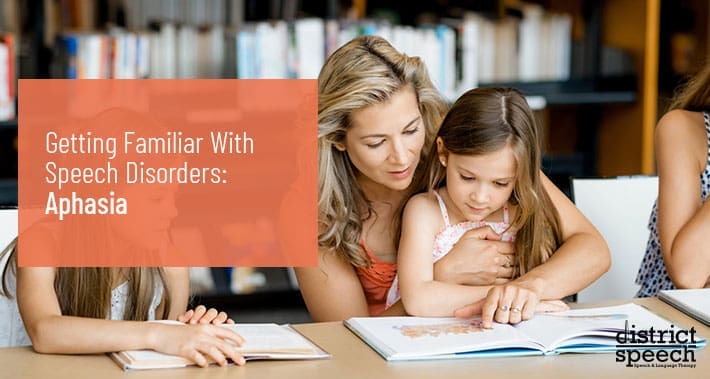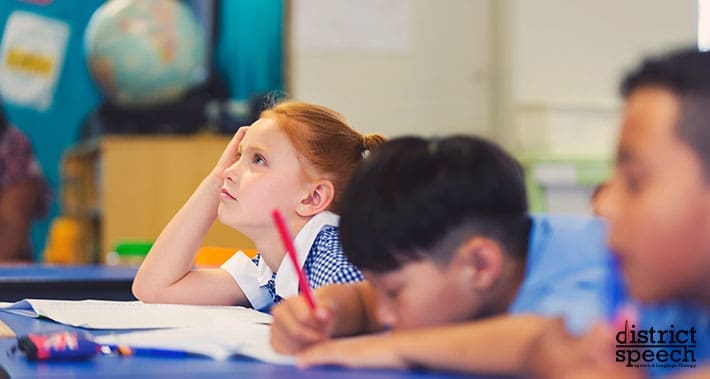
Speech is an important tool in both adults and children alike.
Your ability to speak aids in communication of complex details and developing social relationships.
When you suddenly start struggling with your speech, it can be stressful and frustrating.
Often when we think of speech disorders, we think of developmental issues which occur in children.
There are however many speech disorders which can occur in adults as well.
Today we will take a closer look at one of these, and examine symptoms, causes, and treatments for this adult speech disorder.
Keep reading to learn more.
What Is Aphasia
Aphasia is a condition which occurs in adults and can make it challenging to communicate.
It can hinder your ability to speak, write, read, and understand others.
Aphasia can be caused by a number of things.
Typically, you’d experience aphasia after an illness or injury that affects your brain, such as:
- Stroke
- Traumatic brain injury
- Brain tumor
- Progressive disease
Signs And Symptoms Of Aphasia
Aphasia can affect many different areas of communication.
These include your ability to speak, reading comprehension, and ability to comprehend and communicate with others.
You might find that other people also have difficulty communicating with you.
Let’s have a look at some of the symptoms which might come up in each of these areas.
Literacy
A person with aphasia may have difficulty with some aspects of reading and writing.
These include:
- Having trouble using numbers or doing basic math
- Problems with spelling and stringing words together to form sentences
- Reading, including books, screens, and forms or paperwork
Because of this, aphasia can affect your day to day life.
Things like reading for enjoyment or doing your job may become more challenging than they once were.
Speech
Reading isn’t the only thing you may find affected when you experience aphasia.
Speech may be one of the most noticeable symptoms you begin to experience.
This is because speech doesn’t only affect you, but also your ability to communicate with others.
Symptoms related to speech aphasia include:
- Difficulty forming sentences
- Being unable to think of the words you want to say
- Combining real words with made up words into nonsensical sentences
- Swapping out sounds in words, for example saying “wishdasher” instead of “dishwasher”
- Saying the wrong word
Comprehension
Finally, if you are experiencing aphasia, you may notice that you have difficulty with understanding others.
This may be especially true in loud, crowded places, or if you’re in a group of a lot of people.
You might also notice that you can’t understand people who speak quickly.
You may even notice that some jokes go completely over your head when they wouldn’t before.
This experience can often feel socially isolating and frustrating.
What Causes Aphasia?
The most common reason aphasia develops is as a side effect of a stroke.
A 2015 study in the Journal of Neurology and Translational Neuroscience notes that aphasia is present in 21 to 38 percent of acute strokes.
Although strokes are the most common cause, aphasia can develop from any type of brain damage or injury.
This can include traumatic brain injuries, tumors, or infections.
It can also include degenerative disorders, like Alzheimer’s disease or dementia, Parkinson’s disease, and multiple sclerosis.

How Can A Speech Therapist Test For Aphasia?
If you find you are experiencing signs which could indicate aphasia, a speech therapist can help by testing to determine if this is the cause of your symptoms.
They will test factors such as your ability to:
- Focus
- Remember the names of common items
- Understand words and phrases, and respond to questions
- Follow along with stories
- Read and write
- Read short stories and answering questions based on their content
- Carry on a conversation
- Use words correctly
- Repeat words and phrases
- Obey instructions
- Use forms of communication other than speaking, for instance, pointing or gesturing
How Can A Speech Therapist Treat Aphasia?
If you experience mild aphasia, you might regain your language skills without intervention.
Often, though, you’ll need to undergo speech and language therapy in order to recover your language skills.
Unfortunately, speech rehabilitation can be a long and slow process.
It also requires a lot of hard work.
However, speech therapy will help you improve your speech and prevent your aphasia from getting worse.
Without intervention, it is much more likely that you will begin to struggle more and more with speech.
In addition to helping you improve your speech skills, your speech therapist may also work with you to develop alternative ways to communicate.
This might include hand gestures, writing, or pointing to pictures to help you communicate.
In many cases, these may not be permanent ways to communicate.
However, they can be helpful strategies as you work on restoring your speech so you can still express your needs in the meantime.
Brain stimulation therapy is another interesting area that has been studied in people who experience aphasia due to a stroke.
More research is still being done into the effectiveness of this treatment, however it has been shown to facilitate language recovery.
What To Do If A Loved One Has Aphasia
It can be difficult and even heartbreaking when you lose communication with a friend or loved one because they have developed speech aphasia.
Having patience with them will be key to maintaining trust and communication.
Here are some tips to keep in mind when communicating with someone who has aphasia:
- Keep your pace slow and your sentences simple
- Stop to ensure they understand what you have talked about
- Avoid large group scenarios – one-on-one conversations will be easier for them to follow
- Involve the person with aphasia in the conversation
- Allow time for the other person to digest what you have said, and form a response
- Don’t finish their sentences for them
- Ask clarifying questions to ensure you are understanding what they are saying
- Use drawings, gestures, and other alternative forms of communication to convey meaning
- Reduce distractions
- Have pens and paper readily available, and use drawings to help convey your point when needed
- Use images, words, and pictures to assist with conversation
It can feel frustrating to try to communicate with someone who has difficulty understanding you.
However, it is even more frustrating for them.
A little patience and understanding can go a long way.
Book Your Appointment With District Speech Today
Have you experienced a stroke and are worried that it’s resulted in aphasia?
Or more likely, you’ve been noticing changes in a friend or loved one after a stroke or other brain injury.
If speech and language issues are starting to developing, the sooner you can intervene, the better.
Contact District Speech for a consultation today, whether you suspect aphasia and need a diagnosis, or have a diagnosis and want to start treatment, we can help.
Book your appointment with District Speech today.
1300 I St NW, Suite 400 E,
Washington, DC 20005
- https://g.page/districtspeech
District Speech and Language Therapy specializes in speech therapy, physical therapy, and occupational therapy solutions, for both children and adults, in the Washington D.C and the Arlington Virginia areas.